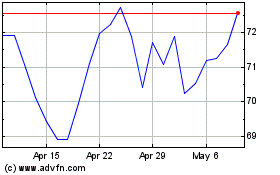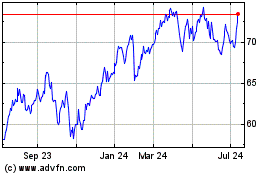Employees to Employers: We Want You to Share Our Values and Make the World a Better Place
November 29 2017 - 8:49AM
Business Wire
And they say they would trade a substantial
amount of their salary if companies deliver on this
As work and life continue to blend together, employees are
bringing their personal values into the office and want companies
not only to recognize those values, but share them and take action.
Fully nine out of 10 employees (89%) say they are willing to trade
some of their salary to work at a company whose values match their
own – a great deal of their salaries in some cases.
These are some of the findings of the new Role of the Company
Survey commissioned by MetLife. Nearly two-thirds of American
workers expect companies to go beyond providing a paycheck and
contribute to their well-being (59%), and contribute to the
well-being of society, as well (57%).
Part of sharing values is looking outside the four walls of the
office – 61% of employees say that it is important to them to work
for a company that contributes to the local community. On average,
they say they are willing to take a 21% pay cut to work for a
company with values aligned to theirs.
The importance of aligned values was strongest for Millennials,
who say they are willing to take the largest pay cut – 34% on
average – to work for a company that shares their values. While
Millennials are typically viewed as the most idealistic generation
in the workforce today, Gen X and Baby Boomers weren’t too far
behind: Gen Xers say they are willing to take an 18% pay cut and
Baby Boomers, 15%, to share values with the company where they
work. This willingness to trade off salary for aligned values is
not reserved for higher income levels but is consistent across all
income brackets: on average, those making less than $50K, between
$50-100K, and $100K+ would take a 22%, 21%, and 19% cut,
respectively.
Companies can reap rewards when they share values and act on
these values, as employees who felt their values aligned with those
of their employers were more than twice as likely to be satisfied
in their jobs (78%) and feel loyal to their companies (77%) than
those whose values didn’t match (32% and 31%, respectively). When
values match, more than three-quarters (78%) plan to stay at their
company, compared to 57% when values are misaligned.
“People across all generations in the workplace today want
companies to play a stronger role in aligning personal purpose with
company actions,” said Jon Richter, vice president of corporate
citizenship for MetLife. “Companies that want to succeed in today’s
marketplace must rise to meet this challenge.”
As part of their expectations on sharing values, employees want
companies to take action on those values, as respondents were three
times more likely to agree that “companies should contribute to the
well-being of communities and society” than “companies should focus
solely on making money” (57% vs. 18%). Responding to these values
took the form of a responsibility of companies to act, including to
improve local communities (75% agree), work broadly to solve
problems that impact employees (63% agree), and be more involved in
improving the environment (60% agree).
Are companies fulfilling their employees’ desire for values
alignment and action? More so than you might think. Respondents
were four times more likely to agree their own company “makes the
world a better place” than they were to disagree (56% vs. 13%).
Another finding sheds light on this optimistic view of their
employer held by many American workers: Despite a common perception
that trust in companies is eroding, 57% still say they trust their
company to “do the right thing” always or most of the time, versus
only 37% who trust companies in general and 26% who feel that way
about the government.
Through its Employee Benefit Trends Study (EBTS), now in its
15th year, MetLife tracks both worker and employer attitudes and
expectations about the role of employee benefits for the workforce.
The next EBTS will be released in April 2018. The Role of the
Company Survey looks at the workplace through a different lens,
revealing what employees and society at large expect of
corporations broadly.
Research Methodology
MetLife’s survey on The Role of the Company was conducted in
July 2017 and was fielded by ORC International, a leading business
intelligence firm. The survey comprised 1,006 interviews with
part-time and full-time U.S. employees, ages 21 and over. The
margin of error was plus or minus 3.5%.
About MetLife
MetLife, Inc. (NYSE: MET), through its subsidiaries and
affiliates (“MetLife”), is one of the world’s leading financial
services companies, providing insurance, annuities, employee
benefits and asset management to help its individual and
institutional customers navigate their changing world. Founded in
1868, MetLife has operations in more than 40 countries and holds
leading market positions in the United States, Japan, Latin
America, Asia, Europe and the Middle East. For more information,
visit www.metlife.com.
View source
version on businesswire.com: http://www.businesswire.com/news/home/20171129005702/en/
MetLife, Inc.Cynthia Millane,
212-578-9474Cynthia.D.Millane@metlife.com
MetLife (NYSE:MET)
Historical Stock Chart
From Mar 2024 to Apr 2024

MetLife (NYSE:MET)
Historical Stock Chart
From Apr 2023 to Apr 2024
